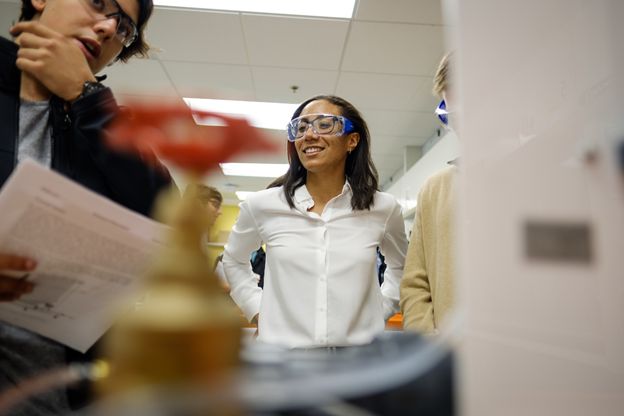Ecohydrology means uncovering the fundamental role of vegetation in the hydrologic cycle. Plants govern a large part of the water and energy budgets. Under similar conditions, changes in leaf density, leaf color, and canopy height can alter the partitioning of water and energy cycle pathways. I find it fascinating that these changes in vegetation can have large impacts on water resources.
What are your undergraduate and graduate degrees in?
I took a non-traditional path. I have a B.A. in Public Policy Studies from Duke University. My M.S. and Ph.D. degrees are in Civil & Environmental Engineering from Duke University.
How did you arrive at working in/thinking about ecohydrology?
As an undergraduate, my interests centered on health and education policy. I was also interested in studying languages so I majored in Public Policy and minored in Spanish and Italian. In my first job out of college, I worked as a research assistant for a behavioral economist at Duke. This helped me develop a love of pursuing research questions but also piqued my interest in building my quantitative skill sets. My PI at the time was supportive of my desire to expand my quantitative knowledge and permitted me the time to take classes in calculus and linear algebra. These classes focused heavily on applying math to real-word problems. The problems that interested me most were those related to the environment. Instead of going on to pursue graduate studies in Sociology, which was my plan, I ended up applying for a M.S. program in Civil & Environmental Engineering. I picked this field because the idea of applying math to model physical environmental processes excited me.
My first research project as a master’s student was in geomorphology but focused on land-atmosphere interactions. This introduced me to the role of land-surface dynamics in mediating the responses that we see belowground and in the atmosphere. Once I started my Ph.D., I began working with land-surface hydrology models and investigating the role that vegetation plays in estimating key components of the energy, water, and carbon budgets. As I delved into this work, I focused on plant-specific processes and investigating how small changes in their representation can have large effects on how we interpret model results.
What do you see as an important emerging area of ecohydrology?
An important emerging area is the development of models that cross or incorporate processes that occur at different spatial and temporal scales. There is a critical need to represent fully the nonlinear dynamics of not only the water and energy cycles, but also to incorporate the nutrient cycles and other biological and chemical processes that govern how vegetation interacts with its surroundings.
Do you have a favorite ecohydrology paper? Describe/explain.
I recently read “Eagleson’s optimality theory of an ecohydrological equilibrium: quo vadis?” by Hatton et al. (1997), and its central thesis really resonated with me. As someone whose research involves modeling ecohydrology processes, I believe that it is always important to state our fundamental assumptions. Ultimately, this involves having some larger theory upon which to base our hypotheses. Because ecohydrology as a field is highly interdisciplinary, we often neglect to state clearly how all of the disciplines come together to provide a unified explanation for what we observe in the data. Eagleson’s optimality provides an underlying theory that attempts to unify hydrology and ecology by hypothesizing how vegetative states equilibrate with their surrounding environment at different timescales, conditional on climate, soil, and transpiration efficiency. It gives ecohydrologists something to react to - to determine whether the data we collect or the results we gather conform or conflict with this explanation for the interrelatedness between hydrology and ecology. I like this reminder to consider the bigger picture and that ultimately we are all working towards a similar scientific goal to understand better the world around us.
What do you do for fun (apart from ecohydrology)?
I play tennis and run. I enjoy the competitive element of tennis and the meditative aspects of running. I really enjoy being outside. I currently live in a neighborhood where I can walk to downtown Winston-Salem and frequently spend my weekends exploring the city or hiking in the nearby Piedmont and Blue Ridge.

 RSS Feed
RSS Feed